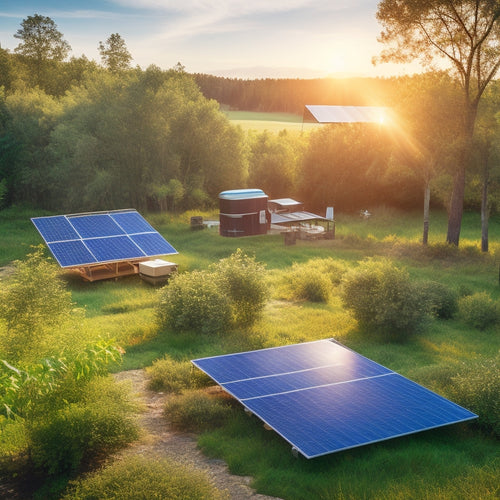
Off Grid Power Solutions
Share
When designing an off-grid power solution, you're not just reducing your reliance on fossil fuels, you're also utilizing the full potential of renewable energy sources like solar, wind, hydro, and biomass to create a sustainable and self-sufficient energy system. By opting for eco-friendly energy options, you'll lower your carbon footprint and generate clean energy. To guarantee energy independence at night, consider whole house battery backup systems and deep cycle batteries that store excess energy for nighttime use. To accurately estimate your power needs, calculate your daily energy requirements and design your system to generate 1.5 to 2 times that amount to account for weather variability. Now that you've started building your off-grid power solution, you're just a step away from accessing the full potential of renewable energy.
The Essentials
- Renewable power sources like solar, wind, hydro, and biomass generate clean energy, reducing reliance on fossil fuels and carbon footprint.
- Accurately estimating daily power requirements and designing off-grid systems to generate 1.5 to 2 times that amount ensures energy independence.
- Energy storage systems, including deep cycle batteries, provide sustainable energy solutions for nighttime use and backup power during grid outages.
- Factors like depth of discharge, charging methods, and environmental conditions affect the lifespan of deep cycle batteries, highlighting the importance of regular maintenance.
- Higher surge capacity rating is essential for handling peak power demands of appliances, preventing system shutdown during high demand periods.
Lower Carbon Footprint Guaranteed
You'll considerably reduce your reliance on fossil fuels by opting for eco-friendly energy options like solar, wind, and hydro power.
These renewable power sources generate clean energy, minimizing your carbon footprint and contributing to a healthier environment.
By leveraging Off Grid Inverter Systems and Solar Energy Storage Inverters(https://www.illchanter.com), you can guarantee a smooth and consistent power output, similar to that of the grid.
Eco-Friendly Energy Options
Embracing eco-friendly energy options is an essential step towards minimizing your carbon footprint and reducing your reliance on fossil fuels. As you shift to off-grid power solutions, you'll need to reflect on various eco-friendly options that cater to your energy needs.
| Eco-Friendly Energy Option | Description | Benefits |
|---|---|---|
| Solar Panel Efficiency | Utilizing solar energy through high-efficiency panels | Zero emissions, low maintenance |
| Wind Turbine Integration | Incorporating wind turbines into your off-grid system | Renewable energy source, reduced carbon footprint |
| Biomass Energy | Converting organic matter into energy | Sustainable, renewable energy source |
| Hydroelectric Systems | Generating energy through water flow | High energy output, low visual impact |
| Geothermal Heating | Exploiting earth's natural heat for energy | Renewable energy source, reduced energy bills |
Renewable Power Sources
Renewable Power Sources (Lower Carbon Footprint Guaranteed)
Frequently, homeowners moving to off-grid power solutions find themselves drawn to renewable power sources, which promise a lower carbon footprint. You're likely considering solar panels or wind turbines to generate electricity.
When it comes to solar panels, you'll want to enhance their efficiency. Look for panels with high conversion rates, typically above 20%. This guarantees you generate the most power from the available sunlight. To achieve ideal energy conversion, consider investing in advanced solar cell technology with high-efficiency photovoltaic cells Energy Efficiency.
Additionally, consider the panel's durability and warranty to guarantee a long lifespan.
If wind turbines are your preferred option, regular maintenance is vital. You'll need to perform routine inspections to confirm the turbine's blades are clean and free of debris. This maintenance will enhance energy production and prevent damage to the turbine.
Wind turbine maintenance also involves lubricating moving parts and replacing worn-out components.
Energy Independence at Night
When the sun sets, you'll need a reliable power source to keep your home running.
You'll want to contemplate solutions that provide powering home after dark, ensuring you have a steady supply of energy even when the grid is unavailable.
With a whole house battery backup system home battery backup system and deep cycle batteries, you can store excess energy generated during the day for use at night.
Powering Home After Dark
Your off-grid power system's ability to perform after dark is essential, as it directly impacts your energy independence. To guarantee you're generating power consistently, you need to optimize your system's components for nighttime performance.
Proper solar panel placement is critical, as it affects the amount of energy you can harvest during the day. By angling your panels correctly, you can maximize energy storage in your batteries for later use.
Additionally, wind turbine integration can provide a reliable source of power after dark. By synchronizing your wind turbine's output with your solar panel's, you can create a hybrid system that generates power continuously.
This redundancy guarantees you're never left in the dark, even on cloudy or windless nights. By fine-tuning your system's components and leveraging both solar and wind power, you can enjoy uninterrupted energy independence, even after the sun sets.
Nighttime Energy Security
Two key components - energy storage and backup power - form the backbone of nighttime energy security, ensuring you maintain energy independence even after dark.
With a reliable energy storage system, such as advanced battery storage, you can store excess solar energy generated during the day for use at night. This allows you to power your home efficiently and sustainably, without relying on the grid.
In the event of an emergency or prolonged grid outage, a backup power system provides an added layer of energy resilience. This can include off-grid technology such as generators or wind turbines, which can kick in to provide power when needed.
By integrating these components into your energy management system, you can achieve nighttime efficiency and power reliability. This means you can enjoy the comforts of modern living, while maintaining your independence from the grid.
With nighttime energy security, you can rest assured that your home will remain powered, even when the sun goes down.
Deep Cycle Battery Life
When you're setting up an off-grid power system, you'll want to take into account the lifespan of your deep cycle batteries, as it directly impacts your energy independence.
Deep cycle batteries, such as Lithium Ion Battery, are designed to provide reliable power storage for off-grid homes and renewable energy systems.
You'll find that factors like depth of discharge, charging methods, and environmental conditions affect your battery's lifespan, and understanding these factors is key to optimizing its performance.
Battery Lifespan Factors
Deep cycle batteries, the backbone of off-grid power systems, are only as reliable as their lifespan permits. As you traverse the world of off-grid energy, understanding the factors that affect your battery's lifespan is vital.
You need to take into account battery maintenance, as neglecting regular checks can lead to premature aging. Temperature effects also play a significant role, with extreme temperatures reducing your battery's lifespan.
The number of charging cycles, discharge rates, and battery chemistry all impact how long your batteries will last. Your usage frequency, load management, and storage conditions also influence your battery's lifespan.
Aging factors, such as corrosion and wear, can't be ignored. Additionally, voltage stability is essential to prevent damage to your batteries.
Cycle Life Expectancy
Reliability hinges on the cycle life expectancy of your deep cycle batteries, a metric that determines how many charge and discharge cycles they can withstand before capacity dwindles. This lifespan is heavily influenced by battery chemistry and maintenance practices. You'll want to choose batteries with a high cycle life expectancy to guarantee your off-grid power system remains reliable for years to come.
| Battery Type | Cycle Life Expectancy | Depth of Discharge (DOD) |
|---|---|---|
| Lead-Acid (Flooded) | 500-1000 cycles | 50% |
| Lead-Acid (AGM) | 1000-2000 cycles | 50% |
| Lithium-Ion | 3000-5000 cycles | 80% |
As you can see, different battery chemistries offer varying levels of cycle life expectancy. Lithium-Ion batteries, for example, can withstand considerably more charge and discharge cycles than Lead-Acid batteries. However, they also require more stringent maintenance practices to maintain their longevity. By selecting the right battery type and following proper maintenance practices, you can maximize your battery's cycle life expectancy and enjoy a reliable off-grid power system.
Assess Your Energy Demands
You need to determine your energy usage patterns to identify the appliances and devices that consume the most power.
For instance, if you plan to use portable solar panels and outdoor batteries to power your devices, you'll need to evaluate the wattage of each device.
To do this, calculate your daily power requirements by adding up the wattage of each device multiplied by the number of hours it's used per day renewable energy camping.
This will give you a clear illustration of your energy demands, enabling you to design an off-grid power system that meets your specific needs.
Energy Usage Patterns
About 20 kilowatt-hours (kWh) per day is the average energy consumption of a typical American household.
But you're not typical, and you're looking to break free from the grid. To do that, you need to understand your energy usage patterns. You'll want to identify your peak hours, when energy consumption is highest, and implement power conservation strategies to reduce demand during those times.
This is where demand response comes in – adjusting your energy usage in response to changes in the grid's availability. By monitoring your energy consumption trends, you can forecast your usage and develop efficiency strategies to optimize your off-grid power system.
Load balancing is essential to guarantee a stable and reliable supply of power. By understanding your energy usage patterns, you'll be able to make informed decisions about your off-grid power system, reducing waste and increasing usage efficiency.
This knowledge will enable you to take control of your energy needs, giving you the freedom you desire.
Daily Power Requirements
Understanding your energy usage patterns sets the stage for accurately estimating your daily power requirements.
Now it's time to crunch some numbers to determine how much power you need to generate daily. Start by listing all your essential appliances and devices, along with their wattage ratings. Calculate the total watt-hours (Wh) required to power each device daily. For example, if you have a 20W LED light that runs for 8 hours, it'll consume 160Wh (20W x 8h) daily.
Next, consider the peak sun hours (PSH) and wind speeds in your area to determine the ideal solar panel efficiency and wind turbine output. This will help you size your renewable energy system correctly.
Aim to generate at least 1.5 to 2 times your daily power requirements to account for variability in weather conditions. By accurately estimating your energy demands, you'll be able to design an off-grid power system that provides reliable and sustainable energy, giving you the freedom to live life on your own terms.
Higher Surge Capacity Rating
When selecting an off-grid power solution, you'll need to evaluate a higher surge capacity rating to accommodate peak power handling.
This is essential because many appliances, such as refrigerators and air conditioners, require a short-term power increase to start up.
Your system's surge capacity rating should be able to handle the maximum power required by these appliances during their startup phase.
Peak Power Handling
Your off-grid power system's peak power handling capacity, also known as its surge capacity rating, determines how well it can handle sudden, brief increases in power demand.
When you're living off the grid, you need a system that can handle peak loads, like when you're running multiple appliances simultaneously. A higher surge capacity rating guarantees your system won't trip or shut down during these periods of high demand.
To achieve effective peak load management, you'll want to take into account energy storage technologies that can handle these sudden spikes in power usage.
For instance, advanced battery systems can absorb and store excess energy during periods of low demand, releasing it when needed during peak periods. This not only prevents system overload but also optimizes energy efficiency.
Frequently Asked Questions
Can I Use Off-Grid Power Solutions for My Entire House?
You can power your entire house with alternative energy sources, leveraging battery storage for reliability and optimizing energy efficiency through smart home systems, freeing you from grid dependence and embracing a self-sufficient lifestyle.
Are Off-Grid Power Systems Affected by Extreme Weather?
You'll be surprised to know that 99% of power outages are weather-related! When extreme weather hits, your off-grid system's weather resilience and system durability are put to the test; a well-designed system will keep you powered up, no matter what Mother Nature throws your way.
How Often Should I Maintenance My Off-Grid Power System?
You should regularly inspect your system, performing battery maintenance every 3-6 months and inverter checks quarterly, to guarantee peak performance and extend its lifespan, giving you the freedom to live life on your own terms.
Can I Add More Solar Panels to My Existing System Later?
You can upgrade your system by adding more solar panels, but first, you'll need to guarantee compatibility with your existing setup, considering factors like voltage, current, and mounting requirements for seamless system expansion options.
Do Off-Grid Power Systems Require Special Installation Skills?
When tackling complex electrical systems, you'll often find that installation requirements demand professional assistance to guarantee safety and efficiency. This is especially true for off-grid power systems, which require specialized knowledge to steer through unique installation challenges.
Final Thoughts
As you stand on the cusp of energy independence, imagine the freedom to power your off-grid lifestyle without worrying about the grid. With a lower carbon footprint guaranteed, you'll be breathing easier too. Can you envision the peace of mind that comes with knowing your deep cycle batteries will last, and your energy demands are met? With a higher surge capacity rating, the possibilities are endless. So, what's holding you back from flipping the switch to off-grid power solutions?
Related Posts
-

How to Achieve a Zero-Waste Lifestyle for a Greener Tomorrow
To achieve a zero-waste lifestyle, start by adopting the principles of refusing, reducing, reusing, and recycling. Sw...
-

Solar Powered Lights for Sustainable Home Decor
Solar-powered lights offer a stylish and eco-friendly way to enhance your home decor. They capture sunlight, converti...
-

Top Off Grid Solar Batteries for Renewable Energy
When seeking top off-grid solar batteries for renewable energy, consider options with advanced battery chemistry, suc...


